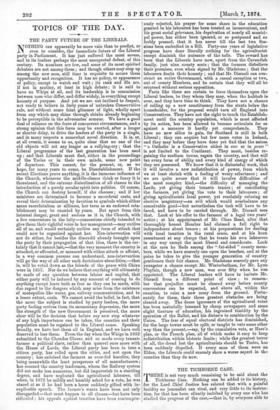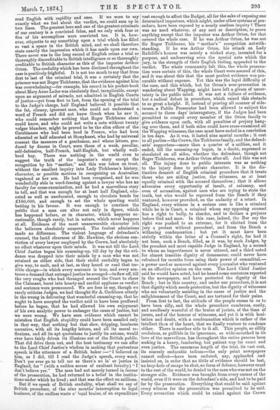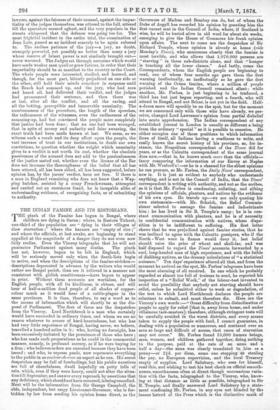THE TICHBORNE CASE.
THERE is not very much remaining to be said about the Tichborne Case. Nothing can be added to its history, for the Lord Chief Justice has related that with a painful lucidity no journalist can rival, and very little to its instruc- tion, for that has been silently imbibed by every one who has studied the progress of the case,—that is, by everyone able to
two lines. The greatest bore and one of the greatest criminals of our century is .a convicted felon, and we only wish four or five of his accomplices were convicted too. It is, how- ever, etiquette to say something upon a trial which has filled so vast a space in the British mind, and we shall therefore state exactly the impression which it has made upon our own. There never was in the long record of English crime a trial so thoroughly discreditable to British intelligence or so thoroughly creditable to British character as this of the impostor Arthur Orton. The credulity which has been disclosed throughout the case is positively frightful. It is not too much to say that from first to last of the criminal trial, it was a certainty that the prisoner was not Roger Tichborne, that the evidence against him was overwhelming—for example, his record in his pocket-book about Mary Anne Loder was absolutely final, inexplicable, except upon an argument of miracle, not admitted in English Courts of justice—yet from first to last, from the opening of the trial to the Judge's charge, half England believed it possible that the fat, clumsy, ignorant man, who could not understand a word of French and did not know Greek when he saw it, who could remember nothing that Roger Tichborne alone could know, and who could not write a note without twenty vulgar blunders, might be proved to be the slim officer of the Carabineers who had been bred in France, who had been educated or half educated at Stonyhurst, who had by universal consent the manners of a gentleman, and whose letters, pro- duced by dozens in Court, were those of a weak, peculiar, self-defensive, half-French, half-English, but wholly well- bred boy. There was nothing in the world even to suggest the truth of the impostor's story except the recognition by his "mother," and this was taken on trust, without the smallest inquiry into Lady Tichborne's history, character, or possible motives in recognising an Australian vagabond as her son. He had been recognised, and he was wonderfully able in word-fencing against a lawyer who has no faculty for cross-examination, and he had a marvellous story to tell, and that was enough for at least half England, edu- cated as well as uneducated, enough to circulate bonds for £100,000, and enough to set the whole sporting world betting in his favour. It was enough to convince the public that a man can alter not only in figure, which has happened before, or in character, which happens oc- casionally, though rarely, but in nature, which never happens at all. Evidence of the most unanswerable character left the believers absolutely unmoved. The foulest admissions made no difference. The violent language of defendant's counsel, the lucid clearness of Mr. Hawkins, the obvious con- viction of every lawyer employed by the Crown, had absolutely no effect whatever upon their minds. It was not till the Lord Chief Justice began his summing-up, till day by day the evi- dence was dropped into their minds by a man who was not retained on either side, that their stolid credulity began to give way, to melt, and at last, as they heard or read that ter- rible charge—in which every sentence is true, and every sen- tence a demand that outraged justice be avenged—to flow off, till the very roughs who bad thronged around the Court to cheer the Claimant, burst into hearty and cordial applause as verdict and sentence were pronounced. We are free to say, though we rarely criticise Judges, we had thought Sir A. Cockburn utterly in the wrong in delivering that wonderful summing-up, that he ought to have accepted the verdict said to have been proffered before he began, that he had allowed his own enjoyment of his own analytic power to endanger the cause of justice, but we were wrong. We have seen evidence which cannot be mistaken that English stupidity could have been assailed only in that way, that nothing but that slow, dripping, luminous narrative, with all its lengthy letters, and all its moral re- flexions, and all its apt quotations to justify its axioms, would credulous, so gullible in its ignorance, so wide-mouthed in its ever have fairly driven its illusions out of the British public. I love of the marvellous, has throughout the entire process been That did drive them out, and the best testimony we can offer seeking in a heavy, lumbering, but patient way for exact and to the Lord Chief Justice's wisdom in making that portentous I even justice. The enormous length of the trial, its vast cost, speech is the utterance of a British baker :—" I believed on him, so I did, till I read the Judge's speech, every word. Don't yer ever go to tell me as there's no la' or justice in England, for" (with a sudden access of exultant ferocity) "I don't believe yer." The man had not merely turned in favour of the prosecution, he had returned to a belief in the institu- tions under which he lived ; and that was the effect on millions.
But if we speak of British credulity, what shall we say of British procedure, of the nine months' interruption to legal business, of the endless waste o' legal brains, of an expenditure read English with rapidity and ease. If we were to say vast enough to affect the Budget, all for the sake of exposing one exactly what we feel about the verdict, we could sum up in determined imposture, which might, under other systems of pro- its scarcely endurable tedium—the only point newspapers cannot reflect—have been endured, nay, applauded and insisted on, in order that no tittle of evidence should be lost, no loop-hole of escape be shut, no form of defence, however cruel to the rest of the world, be denied to the man who was not on the stronger side. Evidence was brought from every corner of the world, even if it were on the defendant's side, and had to be paid for by the prosecution. Everything that could be said against every witness for the prosecution was permitted to be said. Every accusation which could be raised against the Crown cedure, have been exposed by a nearly costless inquiry I There was no need whatever, of any sort or description, to prove anything except that the impostor was Arthur Orton, for that covered the whole case. If he was Arthur Orton, he was not Sir Roger Tichborne, his " mother's " recognition notwith- standing. If he was Arthur Orton, his attack on Lady Radcliffe's honour was merely a wicked story, invented for a purpose, and undeserving even the special note which the jury, in the strength of their English feeling, appended to the verdict. The whole community felt this, the whole prosecu- tion were certain of this, the whole Court were assured of this, and it was about this that the most perfect evidence was pro- curable without expense. Yet this was the legal difficulty of the case, and this which, but for Orton's over-precaution in wandering about Wapping, might have left a gleam of uncer- tainty in the public mind. It was not a failure of evidence, but a radical defect in procedure, which raised this obstacle to so great a height. If, instead of proving all manner of side- issues, a Public Prosecutor had been allowed to subject the accused to three days' interrogatory, if the Judges had been permitted to compel every member of the Orton family to give evidence upon oath, with all penalties of perjury hang- ing over them, and if both sides could have cross-examined all the Wapping witnesses, the case must have ended in a conviction in ten days. As it was, it lasted nine mortal months ; it cost to all parties—the Crown, the Tichborne family, and the defend- ants' supporters—more than a quarter of a million, and it ended, till the summing-up began, in a doubt, expressed or simulated on all sides, whether the defendant, though not Roger Tichborne, was Arthur Orton after all. And this was not all. The injury done to public interests was as nothing to the injury done to private character. It is the dis- tinctive demerit of English criminal procedure that it treats those who are aiding justice, the witnesses, as at least equally criminal with the accused themselves ; that it allows advocates every opportunity of insult, of calumny, and even of accusation, against men who are trying to state the truth, but who would be reproved from the Bench if they ventured, however provoked, on the audacity of a retort. In England, every witness in a serious case is like a criminal while he is in Court, a criminal whom any opposing counsel has a right to bully, to slander, and to declare a perjurer before God and man. In this case, indeed, the Bar say the right was pushed to an extreme, for it elicited from the jury a protest without precedent, and from the Bench a withering condemnation ; but yet it must have been strictly within the letter of a Counsel's right, for had it not been, such a Bench, filled, as it was, by such Judges, by the proudest and most capable Judge in England, by a second to whom an impertinence is never uttered, and a third noted for almost irascible dignity of demeanour, could never have refrained for months from using their power of committal,— a power used or menaced against every journalist who ventured on an effective opinion on the case. The Lord Chief Justice said he would have acted, had he heard some sentences reported in the newspapers, and have protected the dignity of the Bench ; but in this country, and under our procedure, it is not that dignity which needs protection, but the dignity of witnesses who are voluntarily assisting in the cause of justice and the enlightenment of the Court, and are tortured for their pains. From first to last, the attitude of the people seems to us to have been silly, and the whole procedure cumbrous, costly, and needlessly wasteful of the brains of jurists, of the time of jurors, and of the honour of witnesses, and yet it is with hesi- tation and doubt, with a condemnation which is rather of the intellect than of the heart, that we finally venture to condemn either. There is another side to it all. This people, so sillily
lawyers, against the fairness of their counsel, against the impar- tiality of the judges themselves, was uttered to the full, uttered till the spectators seemed aghast, and the very populace in the streets whispered that the defence was going too far. The most frightful incident in the entire trial, the examination of Jean Luie, passed as an incident scarcely to be again referred to. The endless patience of the jury—a jury, no doubt, strangely powerful, yet possibly no better than many a jury whose reserve of latent power is not similarly brought out— never wavered. The Judges sat through sarcasms which would have made weaker men quail or grow furious, in order that their impartiality should be as manifest to the country as the Court. The whole people were interested, studied, and learned, and though, for the most part, bitterly prejudiced on one side or the other, still held their minds somehow in suspense until the Bench had summed up, and the jury, who had seen and heard all, had delivered their verdict, and the judges had pronounced their sentence, and then there was at last, after all the conflict, and all the raving, and all the betting, perceptible and immovable unanimity. The cumbrousness of the procedure, the length of the speeches, the tediousness of the witnesses, even the endlessness of the summing-up, had but convinced the people more completely that justice had been done ; that no one had been wronged, that in spite of money and audacity and false swearing, the exact truth had been made known at last. We seem, as we witness such a result and its deep effect upon the people, the -vast increase of trust in our institutions, to doubt our own convictions, to question whether the weight which unanimity gives to a verdict is not worth its cost, whether the absolute passiveness of the accused does not add to the passionlessness of the justice meted out, whether even the licence of the Bar does not increase the thoroughness of the belief that all has been uttered, all has been sifted, all has been suggested, before opinion has, by the jurors' verdict, been set free. If there is a man in England remaining who does not know that a Wap- ping butcher, assisted by a crazy Frenchwoman, attempted and carried out an enormous fraud, he is incapable alike of understanding evidence, of recognising facts, or of submitting to authority.




































 Previous page
Previous page